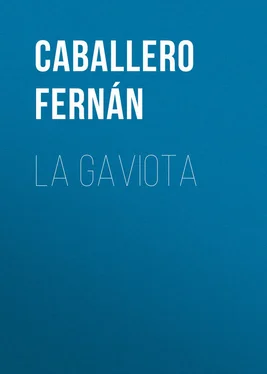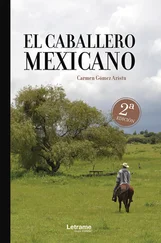Fernán Caballero - La Gaviota
Здесь есть возможность читать онлайн «Fernán Caballero - La Gaviota» — ознакомительный отрывок электронной книги совершенно бесплатно, а после прочтения отрывка купить полную версию. В некоторых случаях можно слушать аудио, скачать через торрент в формате fb2 и присутствует краткое содержание. Жанр: foreign_antique, foreign_prose, на английском языке. Описание произведения, (предисловие) а так же отзывы посетителей доступны на портале библиотеки ЛибКат.
- Название:La Gaviota
- Автор:
- Жанр:
- Год:неизвестен
- ISBN:нет данных
- Рейтинг книги:3 / 5. Голосов: 1
-
Избранное:Добавить в избранное
- Отзывы:
-
Ваша оценка:
- 60
- 1
- 2
- 3
- 4
- 5
La Gaviota: краткое содержание, описание и аннотация
Предлагаем к чтению аннотацию, описание, краткое содержание или предисловие (зависит от того, что написал сам автор книги «La Gaviota»). Если вы не нашли необходимую информацию о книге — напишите в комментариях, мы постараемся отыскать её.
La Gaviota — читать онлайн ознакомительный отрывок
Ниже представлен текст книги, разбитый по страницам. Система сохранения места последней прочитанной страницы, позволяет с удобством читать онлайн бесплатно книгу «La Gaviota», без необходимости каждый раз заново искать на чём Вы остановились. Поставьте закладку, и сможете в любой момент перейти на страницу, на которой закончили чтение.
Интервал:
Закладка:
“Momo,” said Stein, “what does this signify? Is it really a carbine?”
“In looking at it,” replied Momo, “it seems to me to be one.”
“But why do they place a murderous weapon in this holy and peaceful place? In truth, it is not sense to arm Christ with a pair of pistols.”
“But see, then,” replied Momo, “the carbine is not placed in the hands of our Lord; it is at his feet, as an offering. The day on which this carbine was brought here, they called this Christ, the Christ of Good Help .”
“And from what motive?” demanded Stein.
“For what motive!” said Momo in opening his eyes, “everybody knows that, and you know it not!”
“Have you forgotten that I am a stranger?” replied. Stein.
“That is true; I will tell you then: there was formerly in this country a highway robber who did not content himself with robbing, he murdered the people as if they were insects, whether from hatred, whether from fear of being denounced, or whether from caprice. One day two men of this village, two brothers, would undertake a journey. All their friends assembled to conduct them part of the way. There were abundance of good wishes that they might not encounter the bandit who gave quarter to no one, and who terrified everybody. But they, good children, commended themselves to Christ, and departed full of confidence in his protection. At the entrance of a wood of olives, they found themselves face to face with the robber, who came before them, with carbine in hand, rested his gun and aimed. In this extreme peril the two brothers fell on their knees, addressing themselves to Christ: ‘Help us, Lord!’ The bandit pulled the trigger, but whose soul was launched into another world? It was that of the robber: God caused the carbine to burst in the hands of the bandit. And you see now that, in memory of this miraculous assistance, they repaired the carbine with cords, and deposited it here, and it is the Christ who, since then, we implore help from. You knew nothing about it, Don Frederico?”
“Nothing, Momo,” he replied, in adding as if his own reflections: “If you know all that others are ignorant of, they who pretend know every thing.”
“Let us go! will you come?” said Momo after a moment’s silence. “You know I cannot wait.”
“I am fatigued,” replied Stein; “go along, I will wait for you here.”
“God protect you!” and Momo resumed his route, singing:
“God’s sweet protection be your lot,
Is the usual affiance.
Poor be ye rich! for science,
The rich can buy it not.”
Stein contemplated this little village, so tranquil, at once fishing, commercial, and laborious.
It was not like the villages of Germany, an assemblage of houses scattered without order, with their roofs of straw, and their gardens; they resembled in no way those of England, sheltered by the shades of their large trees; nor those of Flanders, which retired to the borders of the roads. It was composed of large streets, although badly made, where the houses, without separate stories, were of various heights, and covered with old tiles; windows were rare, and still more rare, glass and every species of ornament.
But the village contained a grand square, which, in spring, was green as a prairie; on this square was situated a beautiful church: the general aspect was one of charming neatness.
Fourteen crosses, of dimensions equal to that which was near to Stein, were placed equidistant from each other; the last, which was raised in the middle of the square, was opposite to the church: it was the Road of the Cross .
Momo came back, but with a companion, who was old, tall, dry, thin, and stiff as a wax taper. This man was dressed in a coat and pantaloons made of coarse gray cloth; a waistcoat enamelled in faded colors, and embellished with some repairs, real chef-d’œuvres of their kind; a red belt, such as is worn by the peasants; a slouched hat with large rim, ornamented with a cockade which had been red, and which time, the rain, and the sun had colored with the brilliant shades of a watermelon. On each shoulder was a narrow strip of lace, probably destined to secure two much-used epaulets; and then an old sword, suspended from a belt of the same age, completed this ensemble , half military and half rural. Long years had exercised great ravages upon the front part of the long and narrow skull of this being. To supply the natural ornament, he had coaxed towards the forehead the sad remnant of his head of hair, and fixing them there by means of a cord of black silk on the top of his skull, he formed a tuft as gracious as that of a Chinese coxcomb.
“Momo, who is this man?” asked Stein in a low voice.
“The commandant,” the other replied, very simply.
“The commandant of what?” anew asked Stein.
“Of the Fort de San Cristobal.”
“The Fort de San Cristobal!” cried Stein in ecstasy.
“Your servant,” said the newly arrived, saluting him with courtesy; “my name is Modesto Guerrero, and I place at your entire command my useless services.”
The compliment of usage had an application so exact to him who made it, that Stein could not resist a smile in returning his military salute.
“I know who you are,” pursued Don Modesto; “I have taken a prominent part in your contretemps and your misfortunes; I congratulate you on your re-establishment, and on your rencounter with the Alerzas, who are, by my faith, very good kind of people. My person and my house are entirely at your orders; I reside at the Plaza de la Iglesia , that is to say, Place of the Constitution, for that is the name at present. If sometime you would favor it with a visit, the inscription will indicate to you the place.”
“As if he possessed all the village!” said Momo with a sneer.
“Then there is an inscription?” again demanded Stein, who, in the busy life of a camp, had never had time to learn the language of studied compliments, and could not therefore reply to those of the courteous Spaniard.
“Yes, sir,” replied Don Modesto, “the subordinate should obey the orders of his superiors. You should comprehend that in this little village it is not easy to procure a slab of marble with letters of gold, like those you can purchase in Cadiz or Seville. We must have recourse to the schoolmaster, who writes a good hand, and who, to paint the inscription on the walls of common houses, is obliged to place himself at a certain height. The schoolmaster prepared a black color with soot and vinegar mixed, mounted the ladder, and commenced the work by tracing the letters about a foot long. Unfortunately, in wishing to make an elegant flourish, he gave such a violent shake to the ladder that it fell to the earth, carrying with it in its fall the schoolmaster with his pot of black, and all rolled together into the stream. Rosita, my hostess, who from the window had been a witness of this catastrophe, and having seen the unfortunate man come out black as coal, was frightened to that degree that she went into spasms, and continued thus for three days; and in truth I was myself not without some uneasiness. The Alcalde, notwithstanding, gave orders to the poor bruised schoolmaster to complete his work, and saw that the inscription gave only the letters CONSTI. The unfortunate man was ill at ease, but this time he would not use the ladder; he would bring a cart, and place a table on it, and secure it with strong cords. Hoisted upon this improvised scaffolding, the poor devil was so astounded that, reflecting on his accident, he had but one thought, which was, to complete his work as speedily as possible. This is the reason why the last letters, in lieu of being a foot long like the first, are not longer than your thumb; and that is not the worst of it – in his eagerness he forgot one letter at the bottom of his pot of black; and the inscription thus appears:
Читать дальшеИнтервал:
Закладка:
Похожие книги на «La Gaviota»
Представляем Вашему вниманию похожие книги на «La Gaviota» списком для выбора. Мы отобрали схожую по названию и смыслу литературу в надежде предоставить читателям больше вариантов отыскать новые, интересные, ещё непрочитанные произведения.
Обсуждение, отзывы о книге «La Gaviota» и просто собственные мнения читателей. Оставьте ваши комментарии, напишите, что Вы думаете о произведении, его смысле или главных героях. Укажите что конкретно понравилось, а что нет, и почему Вы так считаете.











